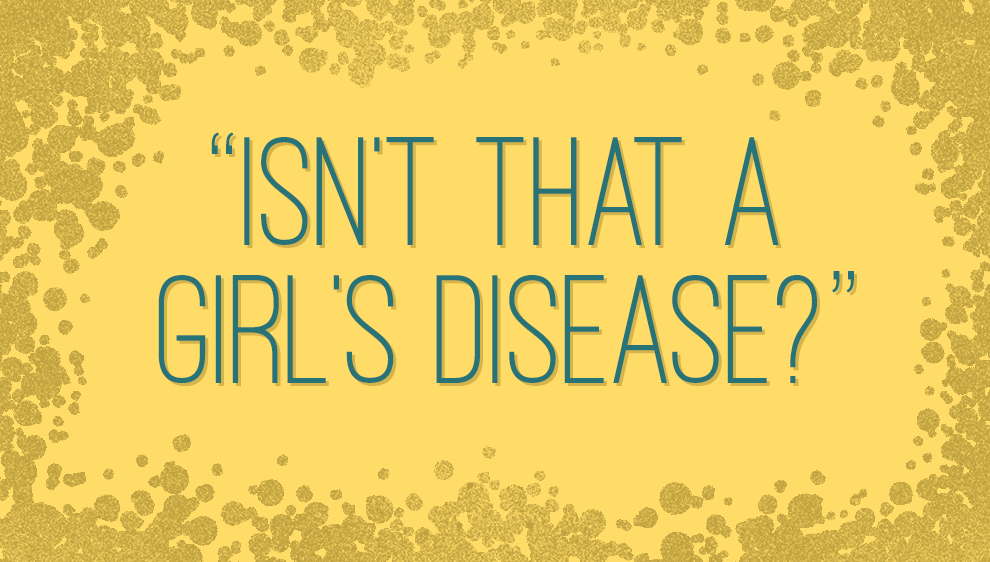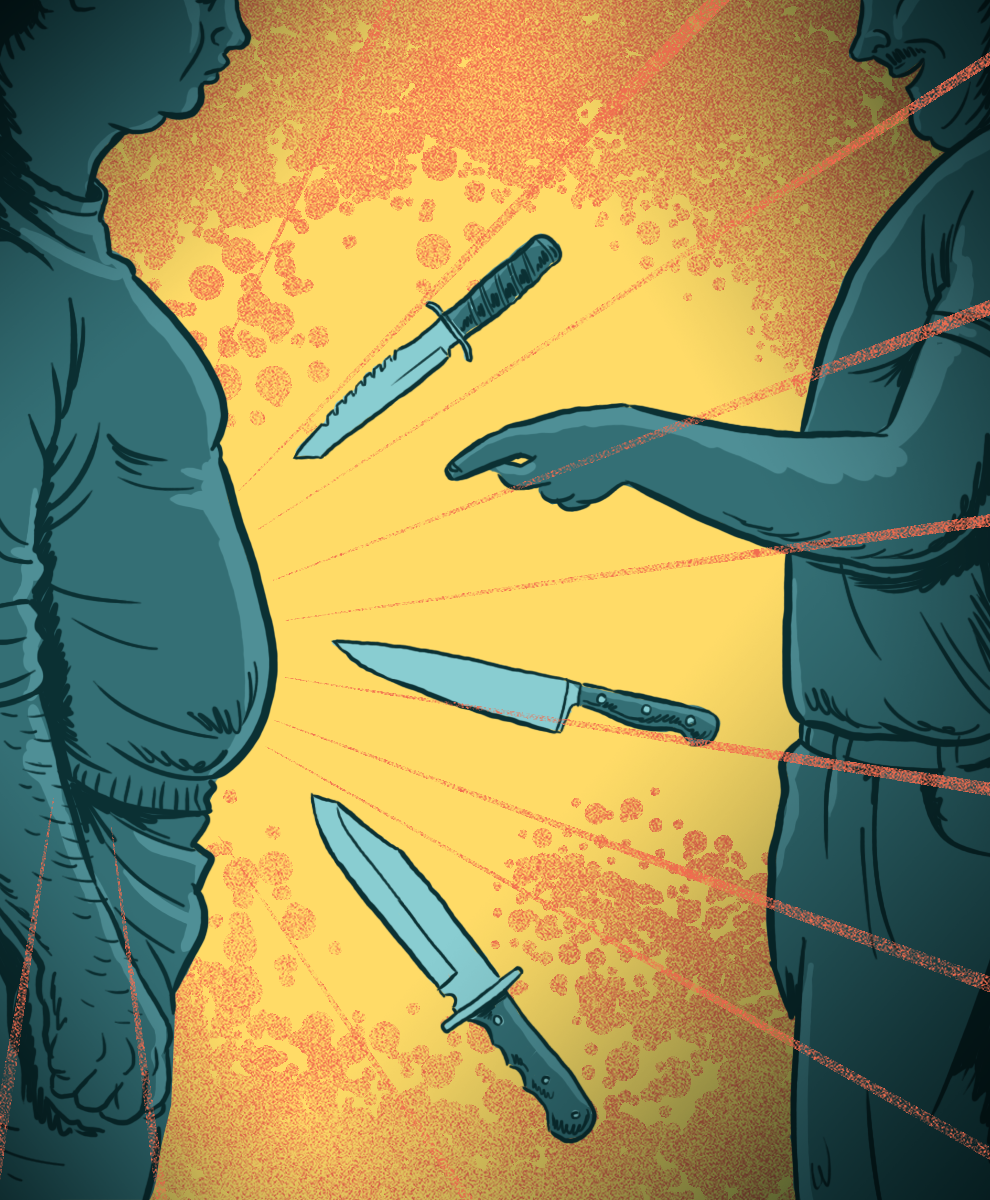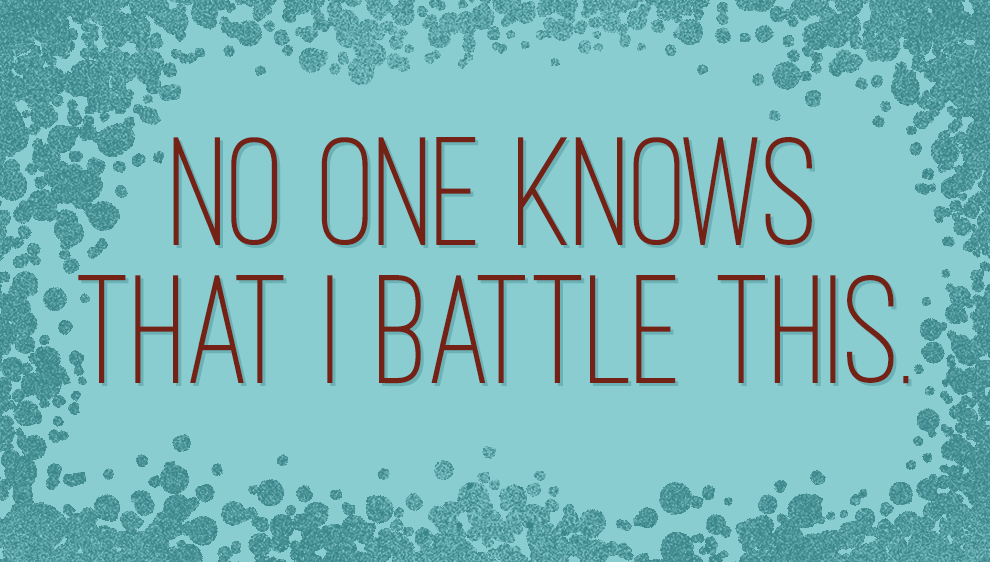
We recently asked men in the BuzzFeed community to tell us what it's like to live with an eating disorder — something often considered to only affect women. These are just some of the men who shared enlightening, heartbreaking, and inspirational stories.
(Please note that these stories aren't substitutes for diagnosis, treatment, or medical advice. If you feel you might have an eating disorder, always consult your doctor!)
1. The student who's too afraid to seek treatment.
I developed anorexia in high school and I've only ever told two people, both guys, because I knew they were going through something similar and wouldn't laugh in my face. My parents are pretty old-fashioned, and don't believe guys get eating disorders, so I could never dream of telling them. I haven't pursued any formal treatment, even after living with this for four years, because I am so incredibly afraid of being judged harshly by my doctors, family, and peers — though I do currently take medicine for anxiety and chronic depression. Mental illness knows no gender, race, or class. No one should be afraid or ashamed to get help.
—Beckham Kelly
2. The Army reserve officer who struggles to make weigh-ins.
I am a reserve Army officer, working for a predominant veterans service organization, and I suffer every day from alternating binging and starving cycles.
Every six months, I have to get a physical fitness test (PFT) for my unit, which includes a weigh-in as well as an archaic body fat test. The Army's standard for body fat levels — governed by a regulation that states one of its main objectives as maintaining "a professional military appearance" — are impossible for me to meet without severe food restriction and starvation. It seems like soldiers place such a high level of importance on physical appearance; one can pass a physical fitness test (push-ups, sit-ups, and a two-mile run), but will get flagged if they don't make weight. Witnessing this type of blatant body-shaming has made me so self-conscious about my weight that I'm stuck in a dangerous cycle of binging and restricting so I can continue to serve my country and advance my career, and I can't even talk about it with my family, co-workers, or fellow soldiers. I want to share my story because I know how few stories exist for men with eating disorders, so they can understand that they aren't freaks or weak.
—Anonymous
3. The actor whose friends couldn't understand his anorexia.
When I was struggling with anorexia nervosa at 14 years old, my medical system (in northern rural British Columbia) didn't actually know what I was struggling with. I had seen at least one doctor who said, "Ah, you're just not eating enough," and others who were skeptical, reluctant to diagnose me. This may have been because I was male, but I also think it's because not a lot of doctors up here were as familiar with what anorexia actually was.
There was a lot of eyebrow raising when my condition was finally diagnosed. I think the hardest part for me was that people didn't know how to take this information. First, no one knew quite what it was ("Don't you just stop eating? Can't you just eat more?") and second, what a male was doing with it. ("Isn't that a girl's disease?") I remember it being hard, and dark, and extremely painful.
I was lucky, though: My parents knew how to deal with me because my older sister had been hospitalized for anorexia three years before I was. My friends and family gave me a lot to live for, and the thought of being ripped away from them forever was a massive fear. If there is any silver lining in me living with this disease, it's that I can talk about it to help others. Now I've been able to use my firsthand knowledge of anorexia to talk to schools, youth groups, friends, fellow actors, and my girlfriend.
—Ted Sloan

4. The baseball player who became fixated on training.
My anorexia started in the summer between the eighth and ninth grade, and came in conjunction with my depression. I was training to be on my high school's baseball team and was exercising a lot, for up to nine hours every day, in the triple-digit heat. Throw in the fact that I was eating very little, and it's no surprise my body wasn't doing well. I knew I needed help, but the main obstacle wasn't accepting I had a problem; it was trying to eat normally again. My brain had completely convinced my body that I was never hungry, and even now, about five and a half years later, I find myself eating less than I probably should. It is something I'm extremely open about for the same reason I am about my depression: I remember how shitty I felt, and I don't ever want anyone to feel as horrible as I did. I don't really encounter stigma in my daily life, though, because the people around me are very supportive, which is a huge plus.
—MY95
5. The college grad whose family pretends his bulimia never happened.
I'm a queer college graduate in my late twenties, raised in a middle-class white family. Both my parents were thin — while my siblings and I struggled with our weight — and there was definitely pressure from an early age to look like them. I started purging a bit while still in middle school, but I feared getting caught. It wasn't until my senior year of high school that I started doing it regularly, even joking about it with friends.
It got worse when I moved away to college. Of course, none of this purging actually did anything to change my weight or shape, but by then it was just as much about punishing myself for being fat as it was about losing weight. I was suffering from severe depression at the same time and eventually ended up being hospitalized for self-inflicted injuries. That was when I first talked to a medical professional, and my family, about my eating disorder.
Things have greatly improved since then, but my family pretends like it never happened. Any time I try to talk to them about it, they act like it's news. I guess they just don't want to, or can't, deal with it. Only a few friends know, though I've been more open about it with people in the queer community, as it seems like a more prevalent problem among men within those circles.
Still, the stigma is very much there, and it takes many forms. Even when I'm being open about it to a sympathetic person, I watch their eyes sweep up and down my body apparently looking for some evidence of the disorder. In those moments, I still can't help but wonder if I look thin enough. Even though I've overcome the physical habits of my disorder, the mental hang-ups are harder to shake.
—Anonymous
6. The dancer who can't stop comparing himself to others.
My weight and image became a big problem in middle school, when I realized my friends in the school locker room didn't have a belly like I did. I decided to start getting more active and began playing a lot of sports, but not much about my body changed. In freshman year of high school, I was diagnosed with ADHD and was prescribed pills that removed my appetite. I lost a lot of weight quickly, but I still wasn't happy. I wanted to be the skinniest guy in the group. I went against my doctor's orders and took the pills more often than they prescribed, just so I wouldn't eat. Once college began, I started having a rough time with my ADHD and dyslexia, and had to drop out. I fell into a deep depression, started drinking heavily, and noticed I was gaining weight. People would poke my belly and make comments, not knowing that each time it was like a stab to my heart, and causing me to have panic attacks.
I began counseling, but I still struggle with my eating to this day, at 21 years old. No one knows that I battle this. I did learn from my mother that my family has been through something similar before — with my father. While my father served in the military there were days he wouldn't eat and he would even purge to stay a certain weight. Finding this out made me feel like I wasn't a freak, but it bothered me to know that both my father and I have dealt with this.
—Jalen Johnson

7. The man who's stuck in a binge-eating cycle.
I am a man who is currently dealing with binge-eating disorder. I have help through mental health services right now, but it's still so difficult to live with. People look at me weirdly, and I hate how I look. It's a never-ending cycle: I feel bad about my weight, so I eat for my comfort. I eat if I'm bored, or depressed. I only tend to be open about it to friends on the internet. I'm trying to deal with my issues, but it's tough when you have no one to talk to about it.
—Anonymous
8. The future psychologist who struggled to find a health professional who knew how to treat him.
My eating disorder started in 2005, early in my freshman year of college, when I began to fixate on eating healthy and working out regularly. I found joy in the newfound power that I had over my life and my body, but it spiraled out of control. With time, it took a real toll on my ability to function, until I couldn't even attend class anymore — I didn't have the strength to walk certain distances, and climbing stairs was out of the question. My friends and family intervened to take my scale away from me and did what they could to help me find real medical attention. I took a medical leave of absence, diagnosed with anorexia nervosa.
The idea of a man having an eating disorder was so foreign to many of my friends and family members; they couldn't even wrap their minds around the possibility. Some people, health professionals included, assumed I had come down with some physical illness that would explain the deteriorating state of my body. Many of the medical professionals who worked with me weren't sure how to approach the treatment of eating disorders, let alone the treatment of eating disorders in men. I felt very lost, very alone, but eventually was lucky enough to find an outpatient clinic that accepted men.
My recovery was lengthy — one step forward and two steps back — but if it weren't for the clinic's help, and the love and support of my family and friends, I honestly don't think that I would be alive today. Amazingly, I have managed to really turn my academic life around, and I will be getting my bachelor's degree in psychology with a 4.0 GPA at the end of this fall semester.
—Jim Jarynowski
9. The 18-year-old whose family loves to eat.
Growing up, I was overweight, wore nerdy clothes, and had weird hobbies. I decided to change all of that the summer I was 14 years old. I started purging, but no one noticed because I blamed my weight loss on my new exercise regimen. Now, four years later, food and I still have an unhealthy relationship. It's difficult for me to go out to restaurants or eat at other people's homes because I know I will purge the meal later, so I feel wasteful.
Being Latino makes it extremely difficult for me to share this information with my family, who, as our culture has dictated, have made a ritual around food. It's not something that I ever plan on bringing up. I've been told that I look like I have a perfect life, but I couldn't disagree more.
—Anonymous

10. The high school teacher who was addicted to restricting.
About 10 years ago, when I was 26 years old, I was diagnosed with anorexia and spent several weeks in a partial hospitalization program. I had never had a "gym body" and always considered myself to be overweight and unattractive, and I joined Weight Watchers — a fantastic program if you do not have an eating disorder, but for me, it offered rewards based on how much I could restrict my eating.
Losing weight was like a drug to me, just another manifestation of addiction. (I'm also a recovering alcoholic, four years sober.) Obsessing over food filled a need, and the need was to dull any other emotions that I felt. If you're irritable and hungry all the time, it is easy to be numb to the rest of the world. When I went into treatment, it actually felt a bit embarrassing. I am a high school English teacher, and I was in treatment with a lot of girls who could have been my students. Overall, the group was made up of mostly women, and there were only three men throughout my time there.
Even though I no longer restrict my eating, I still have horribly distorted body image, and, as twisted as it sounds, I often wish I could once again summon the "willpower" it took to starve myself. It is very easy to forget the crushing depression that went along with it.
—Jeremy
11. The man who learned to redefine his relationship with food.
My eating disorder began 10 years ago, when I was 16. I wanted to lose weight and started eating less and less; when I did eat, it was all low-fat or no-fat foods. After a few months of that, I began to binge and purge. I was so elated by my "progress" (i.e., weight loss) that I continued, and more vigorously. Because I was a black male, people at school thought an eating disorder was a pretty unfathomable cause of my weight loss, so – even though I was a top-ranked and actively involved student – people often assumed I was strung out on drugs.
My parents tried dropping me off at two different eating disorder recovery clinics, and both times, I was able to convince medical professionals that my parents were overreacting. I was not admitted either time. I finally got on the road to beating it when I was in college and learned how to eat well.
My situation was unique in that I needed to deal with it on my own. I wasn't comfortable sharing details with people around me, even a medical professional. I needed time; I needed education; most important, I needed someone to tell me that what I was doing wasn't healthy. I needed to learn that there are healthy, easy food options that will actually taste good and be good for my body and help me achieve my goals.
—Gregory McElroy
12. The teen who became obsessed with pro-ED websites.
When I started my sophomore year of high school, I was still pretty chubby. Relatives at family events would always make comments like "How cute, you still have your baby fat," and "Double chins run in the family." This wasn't what a closeted 16-year-old wanted to hear. One day in health class, we started to have a group discussion about eating disorders, and my teacher had us watch a Lifetime movie from the late '90s called A Secret Between Friends. It was my first look at what eating disorders actually looked like — and, to me, they looked pretty great.
I became obsessed with ED (eating disorders) and their culture. I found blogs and websites dedicated to helping people develop and advance their ED. There was a section called "thinspiration" and had pictures of extremely thin women. Another section had quotes like "nothing tastes as good as thin feels" and "a moment on the lips a lifetime on the hips." I idolized these people; I wanted to be that thin.
The summer before junior year, I decided I would start restricting, or extreme dieting. I noticed changes in my body almost immediately, and I liked it. Some of the senior girls that I looked up to at school complimented me on how great I looked. It was just fuel to the fire.
I was irritable and always tired, and I wasn't my fun, upbeat self. My parents realized I couldn't eat in front of them, and I agreed to talk to a therapist. For the next couple of months I struggled with eating and restricting, but eventually I got to a point where I could eat like "normal" again. Almost seven years later, I still struggle somewhat with restricting. I know I can slide back into my old ways very easily, especially if I try to diet even for a couple of days, but I also know that I'm bigger than my ED.
—Anonymous
For more information on eating disorders and resources that can help, visit the National Eating Disorders Association or the National Association of Anorexia Nervosa and Associated Disorders.
These posts have been edited for length and clarity.

All this week we're talking about mental health. If you liked this story, you might also like reading these:
* 12 Things People Don't Understand About Eating Disorders
* 15 Things You Shouldn't Say To Someone With An Eating Disorder

